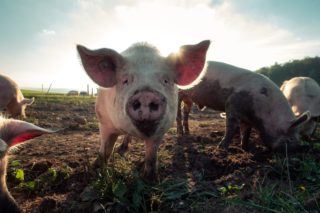While many of us were enjoying a festive break, debate and dissent broke out in the news media about the International Agency for Research on Cancer (IARC) findings on cancer and processed meat. After years of research, IARC confirmed findings that the consumption of bacon (and other processed meats), has a direct link to cancer. They’ve also raised big red flags around red meat consumption and glyphosate weedkiller.
It appears there are some unhappy people and companies who felt the IARC had not shared the findings responsibly.
Who is IARC?
IARC is considered the global authority on cancer, so when a report of this nature is released, it is taken very seriously. Indeed, IARC falls under the scope of the World Health Organisation, although operates with independence. It was set up in 1965 and has a long history of doing excellent work. Christopher Wilde told The Guardian, that IARC has” helped countries manage the scale of cancer around the globe, helping countries to develop big data sets to know their own cancer burden and how well they are treating it.”
It has also established the cause of some cancers that were a mystery. These include home-brewed alcohol which has been fueling esophageal cancer in Southern Africa. It helped traced kidney cancers in Romania. It has also evaluated prevention measures, establishing, for instance, that two shots of the jab against the HPV (human papillomavirus) against cervical cancer work as well as three, making it more practical and affordable to introduce in developing countries. So IARC’s work has credibility and has been found to be in the human interest.
Why does IARC’s research on bacon and cancer matter?
Cancer kills more than 8 million people a year worldwide, with more than 14 million new cases appearing annually. So when we read that a food that is eaten by millions around the world, may be harmful, it is certain to get airtime.
The IARC ‘s research says just 50g of processed meat a day raises the risk of colorectal cancer by 18%. This is equivalent to just a couple of rashers of bacon or one hot dog. The researchers explained that eating these would raise the risk of getting bowel cancer by 18% over a lifetime.
According to a report by The Guardian, “WHO announced these findings after advice from 22 cancer experts from 10 countries, who reviewed more than 400 studies on processed meat covering epidemiological data from hundreds of thousands of people. It was now possible to say that “eat less processed meat”, much like “eat more vegetables”, had become one of the very few absolutely incontrovertible pieces of evidence-based diet advice – not simply another high-profile nutrition fad.”
There is other evidence that eating processed meat causes an additional 34,000 worldwide cancer. The IARC research does not stand alone. Cancer Research UK, a research body with far much more resources and also extensive studies has shown that if no one ate processed or red meat in Britain, there would be 8,800 fewer cases of cancer.
Then there is the research out of Glasgow University. In January 2018, a large-scale study using data from 262,195 British women also suggested that consuming just 9g of bacon a day – less than a rasher – could significantly raise the risk of developing breast cancer later in life. The study’s lead author, Jill Pell from the Institute of Health and Wellbeing at Glasgow University, told The Guardian’s Bee Wilson that while it can be counterproductive to push for total abstinence, the scientific evidence suggests “it would be misleading” for health authorities to set any safe dose for processed meat “other than zero”.
Nitrates and nitrites levels in food are considered dangerous
So why is processed meat, and in this case bacon so bad for us? The answer lies in how the meat is processed. The nitrites and nitrates used in the factories are said to be the main carcinogenic contributors.
If you Google, you will find a Q&A on the WHO website, and under point 18 you will read this.
Q: What makes red meat and processed meat increase the risk of cancer?
A: “Meat consists of multiple components, such as haem iron. Meat can also contain chemicals that form during meat processing or cooking. For instance, carcinogenic chemicals that form during meat processing include N-nitroso compounds and polycyclic aromatic hydrocarbons. Cooking red meat or processed meat also produces heterocyclic aromatic amines as well as other chemicals including polycyclic aromatic hydrocarbons, which are also found in other foods and in air pollution. Some of these chemicals are known or suspected carcinogens, but despite this knowledge, it is not yet fully understood how cancer risk is increased by red meat or processed meat.”
A study published in The American Journal of Clinical Nutrition back in 2011 titled, N-nitroso compounds and cancer incidence: the European Prospective Investigation into Cancer and Nutrition (EPIC)–Norfolk Study, .
“N-nitroso compounds (NOCs) can induce cancer in about 40 different animal species, including higher primates, and are carcinogenic in multiple organs in animals (1). In humans, there is supporting evidence for a role of NOCs in the cause of certain cancers such as gastric, esophageal, nasopharyngeal, and colon cancers (2, 3). Several NOCs are potential human carcinogens (4, 5), including N-nitrosodimethylamine (NDMA), which has been classified as “probably carcinogenic to humans” (4, 6).
Human beings are exposed to preformed NOCs from sources such as tobacco products, diet, drugs, and occupational environments and NOCs produced in vivo (3).”
Interestingly, just a year ago Members of the European Parliament (MEPs) called on the European Commission to reduce legal limits or ban nitrites in meat products due to the link with cancer. Well, that makes you think, doesn’t it?

Are there other ways to manufacture these products that would make them significantly less carcinogenic? Organic farmers who also butcher on-site, do not use nitrates or nitrites and prove it’s possible to deliver healthy, tasty bacon to consumers without using these compounds in the processing of the meat.
There are also a growing number of experts who believe processed meats will be “the next sugar. ” A food so harmful that there will be demands for government agencies to step in and protect consumers.
This doesn’t mean to say consumers are helpless in the face of this. After all, consumers have the spending power and can decide what they to eat and who they want to buy from. From a health perspective, it makes sense to actively support organic food producers for healthier outcomes and say no to big food producers who are not transparent or taking these issues seriously.
Want to read more about the controversy around the bacon cancer findings?
The Guardian in the UK has published various excellent and well-researched reports on this subject.
This report by Bee Wilson is startling and a must-read
This article includes an interview with the Outgoing Director of IARC, Christopher Wilde.



![women [longevity live]](https://longevitylive.com/wp-content/uploads/2020/01/photo-of-women-walking-down-the-street-1116984-100x100.jpg)










